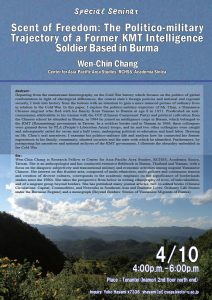The seminar by Dr. Chang Wenchin scheduled on April 10th will be
postponed due to the COVID-19 virus emergency.
 Date and Time : 4:00p.m.-6:00p.m. Friday, April 10th, 2020
Date and Time : 4:00p.m.-6:00p.m. Friday, April 10th, 2020
Venue: Tonan-tei (Inamori 2nd floor north end)
Title: Scent of Freedom: The Politico-military Trajectory of a Former KMT Intelligence Soldier Based in Burma
Wen-Chin Chang (Center for Asia-Pacific Area Studies, RCHSS, Academia Sinica)
Abstract:
Departing from the mainstream historiography on the Cold War history which focuses on the politics of global confrontation in light of ideological differences, the central state’s foreign policies and national and regional security, I look into history from the bottom with an intention to gain a more nuanced picture of ordinary lives in relation to the Cold War. In this paper, I explore the politico-military trajectory of Mr. Chen, a Yunnanese Chinese migrant who fled with his family from Yunnan to Burma at age 8 in 1951. Predicated on anti-communism attributable to his trauma with the CCP (Chinese Communist Party) and political cultivation from the Chinese school he attended in Burma, in 1964 he joined an intelligence corps in Burma, which belonged to the KMT (Kuomintang) government in Taiwan. In a reckless border raid in Yunnan in 1966, three colleagues were gunned down by PLA (People’s Liberation Army) troops, and he and two other colleagues were caught and subsequently jailed for seven and a half years, undergoing political re-education and hard labor. Drawing on Mr. Chen’s oral narratives, I examine his politico-military life and analyze how he connected his former experiences to his family, community, situated societies and the state with which he identified. Furthermore, by juxtaposing his narratives and national archives of the KMT government, I illustrate the absurdity embedded in the Cold War.
Bio:
Wen-Chin Chang is Research Fellow at Center for Asia-Pacific Area Studies, RCHSS, Academia Sinica, Taiwan. She is an anthropologist and has conducted extensive fieldwork in Burma, Thailand and Yunnan, with a focus on the diasporic subjectivity and transnational military and economic activities among migrant Yunnanese Chinese. Her interest on this frontier area, composed of multi-ethnicities, multi-polities and continuous tension and creation of diverse cultures, corresponds to the academic emphasis on the significance of borderlands studies since the 1980s. She takes the perspective from below in writing ethnography of lives, of individualities, and of a migrant group beyond borders. She has published many journal articles, two co-edited books (Chinese Circulations: Capital, Commodities, and Networks in Southeast Asia and Burmese Lives: Ordinary Life Stories under the Burmese Regime) and a monograph (Beyond Borders: Stories of Yunnanese Migrants of Burma).
Contact:
Yoko Hayami